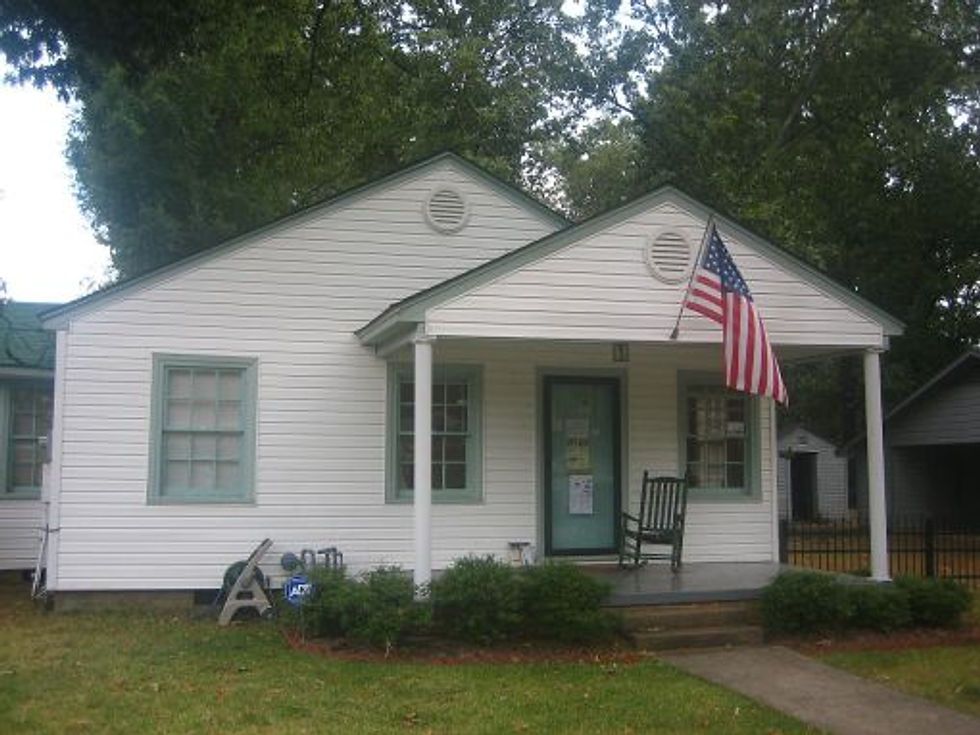50 States in 50 Days: Two Famous Arkansans: Bill Clinton & Douglas MacArthur
- Kiev son
- Jun 25, 2012
- 3 min read
Posted by: Samuel Gabel, Public Affairs Section Assistant
Bill Clinton was born in the little town of Hope, Arkansas in 1946. During his school years, he showed himself to be a bright student and a skilled saxophonist. At one point, he even considered pursuing a career as a professional musician. However, he came to the conclusion that the place he would shine best would be in public service.

Bill Clinton boyhood home in Hope, Arkansas
After high school, he attended Georgetown University where he studied international affairs. He also won the prestigious Rhodes scholarship which enabled him to study at Oxford University in England. After his time at Oxford, he attended Yale Law School, where he met Hillary Rodham. After their graduation, in 1973 the two were married.
The Clintons moved to Arkansas where Bill soon entered into the political arena. He was elected attorney general in 1976. In 1978 he became the governor of Arkansas, one of the youngest U.S. governors in history. He suffered a defeat in the next election, but regained his position in the one following. His government took a centrist approach, pursuing both liberal and conservative causes.

Clinton, as the newly elected Governor of Arkansas, meeting with President Jimmy Carter in 1978
In 1992 he ran for president. He beat incumbent George H.W. Bush in a campaign emphasizing economic concerns. In 1996, he defeated Bob Dole to win a second term as president. His presidency was best known for economic prosperity and the infamous Lewinski sexual scandal. The latter brought him the dubious distinction of being only the second president in U.S. history to be impeached (like Andrew Johnson before him, he was acquitted by the Senate). Despite this setback, toward the end of his presidency and in the years since, he has managed to regain a good deal of popularity. Today he remains active on the geopolitical stage, supporting various causes in education, health, and the environment. The Clinton Presidential Library can be found in Little Rock.

Night view of the William Clinton Presidential Center in Little Rock, AR
Douglas MacArthur was born into a military family in 1880, at Little Rock Barracks in Arkansas. He was raised on the Western frontier, where, it is said, he learned to ride and shoot even before he could read and write. He went on to graduate at the top of his class from the U.S. Army Military Academy in 1903. During World War I he lead troops in France, and was promoted to brigadier general. In 1935 he was tasked with creating and organizing the Philippine armed forces. When it was time for him to transfer to a new duty station, he resigned his position in the U.S. military to continue his work with the Filipinos.

MacArthur in Manila, ca. 1945
Because of the threat posed by Imperial Japan in 1941, MacArthur was recalled to active duty. He was appointed commander of U.S. Army forces in the Far East. When the Japanese attacked the Philippines, MacArthur and his forces were defeated. He and his family were evacuated to Australia where he famously declared, “I shall return.”
In 1942, MacArthur was appointed supreme commander of the Allied forces in the Southwest Pacific. He oversaw the U.S. “island hopping” campaign. In 1944, after his forces had liberated the Philippines from Japanese control, he famously waded ashore and declared, “I have returned.”
MacArthur officially accepted Japan’s surrender in 1945. In the following years, he oversaw Japan’s military demobilization and economic reconstruction.

Emperor Hirohito and General MacArthur, at their first meeting, at the U.S. Embassy, Tokyo, 27 September, 1945
When the Korean War broke out, MacArthur was appointed head of the U.S.-led coalition of United Nations troops. Under his command, the coalition pushed the North Korean Communist forces out of South Korea, and up through North Korea, all the way back to the Chinese border. Soon, Chinese troops poured over the border and pushed MacArthur’s men back into South Korea. In response, MacArthur asked President Truman for permission to bomb China. Fearing that such action could lead to World War III, Truman refused. MacArthur protested Truman’s decision and was subsequently removed from his position for insubordination. His removal triggered a good deal of uproar among the American public. In 1952 many suggested that MacArthur should run for president. However, he never ran for office. Throughout the rest of his life he continued to enjoy public admiration. He died in 1964. Today a number of streets and public works named in his honor carry on the memory of this son of Arkansas.

Medal of Honor Plaque for Douglas MacArthur affixed to MacArthur barracks, West Point, NY





Comments